Supreme Court To Decide Case Involving Transgender Student’s Use Of Bathroom
The Supreme Court has agreed to hear a case involving Federal law and the rights of transgender students.
The Supreme Court has agreed to hear a case out of Virginia involving the contentious issue of whether, and to what extent, public schools should be required to accommodate transgender students by allowing them to use the bathroom designated for the gender they identify with rather than their biological gender:
WASHINGTON — The Supreme Court on Friday entered the national debate over transgender rights, announcing that it would decide whether a transgender boy may use the boys’ bathroom in a Virginia high school.
The court is acting just a year after it established a constitutional right to same-sex marriage, as state laws and federal actions on transgender rights have prompted a welter of lawsuits. In taking the case, the court signaled that it may move more quickly in the area of transgender rights than it has in expanding gay rights.
The public debate has been ignited, in part, by a North Carolina law that requires transgender people to use bathrooms in government buildings that correspond with the gender listed on their birth certificates, a statute that has drawn protests, boycotts and lawsuits.
The case revolves around how the Obama administration is entitled to interpret a federal regulation under a 1972 law that bans discrimination “on the basis of sex” in schools that receive federal money. The legal question is whether it can also ban discrimination based on gender identity.
The Department of Education said last year that schools “generally must treat transgender students consistent with their gender identity.” In May, the department went further, saying that schools could lose federal money if they discriminate against transgender students.
That left school districts grappling with how to treat transgender students. In August, a federal judge in Texas blocked Obama administration guidelines on restroom access for such students.
The case the Supreme Court agreed to hear concerns Gavin Grimm, who was designated female at birth but identifies as male. He attends Gloucester High School in southeastern Virginia.
For a time, school administrators allowed Mr. Grimm, 17, to use the boys’ bathroom, but the local school board later adopted a policy that required students to use the bathrooms and locker rooms for their “corresponding biological genders.” The board added that “students with gender identity issues” would be allowed to use private bathrooms.
The American Civil Liberties Union, which represents Mr. Grimm, told the justices that “girls objected to his presence in the girls’ restrooms because they perceived him to be male.” The group’s brief said requiring Mr. Grimm to use a private bathroom had been humiliating and had, quoting him, “turned him into ‘a public spectacle’ before the entire community, ‘like a walking freak show.'”
Mr. Grimm, the brief said, “avoids drinking liquids and tries not to urinate during the school day” and has, as a consequence, “developed painful urinary tract infections and felt distracted and uncomfortable in class.”
In a statement issued on Friday, Mr. Grimm said: “I never thought that my restroom use would ever turn into any kind of national debate. The only thing I ever asked for was the right to be treated like everyone else.”
He continued: “While I’m disappointed that I will have to spend my final school year being singled out and treated differently from every other guy, I will do everything I can to make sure that other transgender students don’t have to go through the same experience.”
Speaking of the Supreme Court’s decision, Shannon Minter, the legal director of the National Center for Lesbian Rights, said: “This is one of the most important days in the history of the transgender movement. The outcome of this case is likely to shape the future of that movement in ways that will resonate for a very long time.”
Gary McCaleb, a lawyer with Alliance Defending Freedom, which filed a brief supporting the school board in Virginia, said, “Schools have a duty to protect the privacy and safety of all students.”
“In light of the right to bodily privacy, federal law should not be twisted to require that a male be given access to the girls’ facilities, or a female to the boys’ facilities,” he said.
After Mr. Grimm challenged the school board’s bathroom policy in court last year, a divided panel of the United States Court of Appeals for the Fourth Circuit, in Richmond, Va., ruled the policy unlawful. A trial judge then ordered school officials to let Mr. Grimm use the boys’ bathroom.
A 1975 regulation adopted under the 1972 law, Title IX, allowed schools to provide “separate toilet, locker rooms and shower facilities on the basis of sex.” The Fourth Circuit said that it was ambiguous and that the Education Department’s interpretation of it was entitled to “controlling weight.”
As a preliminary matter, it is important to note what the Court is and isn’t deciding in this case, especially since the commentary I’ve read about this in the media seems to be overstating what the issues in the case actually are. For one thing, the Court is not deciding whether or not there is a Constitutional right for transgender students or adults to use the bathroom of the gender they identify with, nor is it deciding if other members of the public have some sort of right to bodily privacy that would allow them to object to someone who identifies as female but was born male to use the same bathroom facilities as they do. Instead, the Court is being asked to decide the extent to which a regulatory agency, in this case the Department of Education, should be given deference to interpret the statutes it is charged with implementing. In this case, the question concerns a set of guidelines issued by the DoE informing public schools of the Department’s conclusion that a 1972 law passed by Congress barring discrimination based on gender covered this situation and that their interpretation of that statute required recognition of the gender identity claims of transgender students meant that they had to comply with all reasonable requests for accommodation. Previously, the Supreme Court has held in a case called Auer v. Robbins that Federal Courts should defer to agency interpretations of its regulations, so the issue here is whether the agency’s interpretation of the relevant statute was based on a permissible construction of the statute. This same issue is also at issue in a lawsuit filed by Texas and a number of other states against the Department of Education regarding this interpretation. In August, the Federal Court hearing that matter issued a stay against the DoE regulations until the matter could be resolved on the merits.
Amy Howe at SCOTUSBlog notes that this case seems likely to be heard some time during the Court’s February hearing schedule. The question, of course, is whether that will be a hearing before a full Court of nine Justices or before the current make up of eight Justices. That will depend on whether or not a new Justice can be confirmed prior to the time that the case would be heard. As things stand, it still seems unlikely that the Senate will give Merrick Garland a hearing or vote prior to President Obama leaving office, at least as long as Republicans control the Senate. This would leave it up to the new President to appoint a Justice and for the Senate that will be seated after the election to act on that nomination. Theoretically, I suppose it’s possible that the new President could act quickly enough after January 20th to get a nomination to the Senate, and that the Senate could expedite hearings and a vote on that nominee so that he or she takes office as soon as possible. Given the current rhetoric from Republicans regarding blocking any nominee from Hillary Clinton should she become President, though, the odds of that happening could be quite low. What this means, of course, is that it’s likely we’ll end up with a divided Court, depending largely on Anthony Kennedy’s swing vote. If Kennedy votes with the Court’s liberals to uphold the DoE policy, then we’ll have a 5-3 decision upholding the Fourth Circuit’s ruling in this case in favor of the transgender student. If the Court is evenly divided, then the Fourth Circuit’s ruling will similarly be upheld but there will be no national precedent set and this issue will remain unresolved.
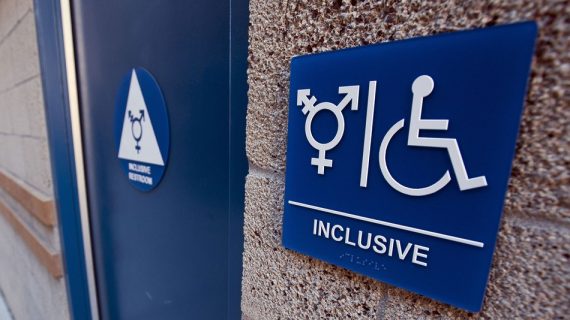

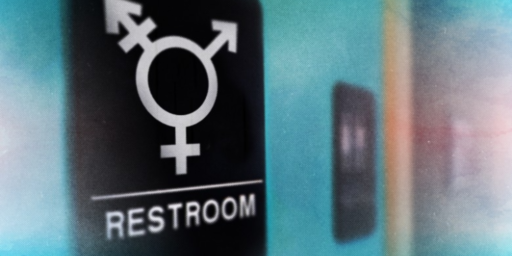
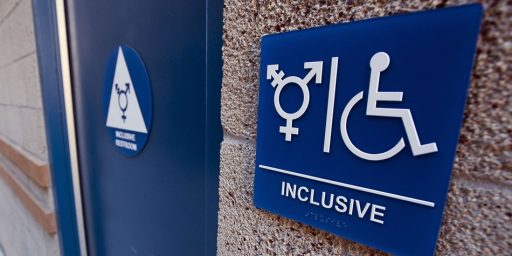
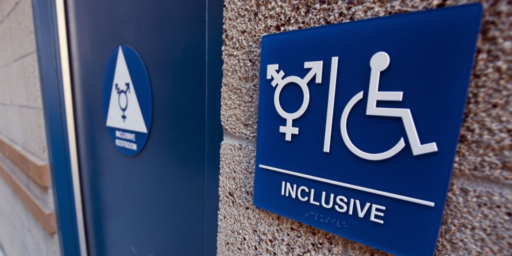
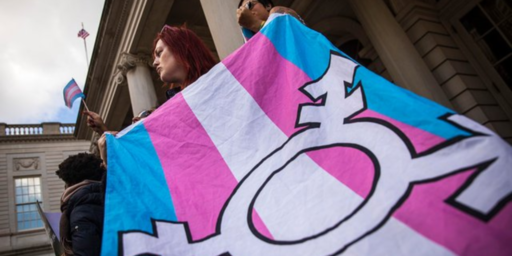
While he SCOTUS decision may be of importance, the controversy may be moot by the time the Justices decide. As this is just an agency interpretation of a law, President Trump can simply alter that interpretation.
An interesting passage I recently came across that addresses judge made “law”
Finally, assuming the court rules correctly, Donald Trump will have the right to use the men’s room, despite a complete lack of evidence that he is a man.
@JKB: Every now and then you start to make a weird sort of sense. Fortunately, you inevitably then quote von Mises, and the smoke clears…
Interesting but the reasons to hate the HB2 bill have barely begun when the transgender bathroom-access issue is exhausted. There is the provision that says no city, county, agency, etc in NC can put a non-discrimination clause in any contract if that non-discrimination clause includes LBGT folks. That one by itself should kill the bill — making TWO reasons to wish HB2 a quick death.
But wait! There’s more!
Part 3 of the bill strips all protections granted by all the municipalities, counties, agencies and such of NC from LGBT’s. Those protections can only be granted by a future state legislature.
Do I understand the law correctly that if HB2 is enacted and then Part I is struck down all the rest of the law remains in force? Unless someone with knowledge of the law to tell me I have it wrong, I am really really unimpressed with the Supremes accepting this narrow part of an obnoxious law for review.
I was a bit surprised when I saw that the court took this case, initially believing it was a rights case. It seemed to me in the past the supremes would let issues such as these marinate in the culture for a while before taking them up. Doug thanks for the explanation that it is a regulatory boundaries review. It makes sense that the court would accept such a case.
The Supreme Court need not be involved in that area.
There are a few times that I have been in a public men’s restroom and a lady would come in with a young boy. It did not bother me or the other men in there. Most women would prefer not to use the men’s restroom and one of the main reasons is that the deal with the toilet seats being wet and men’s restrooms that I have been in are not very clean. The other issue is the urinal conundrum. Women really are aghast and shocked to find out that a men’s restroom urinals are side by side with usually no panel between them. I was in an arena the other night and I’ll bet there were 100 urinals side by side; but the restroom was spacious, clean, bright, and a beautiful blue tile and countertops: much better than the average fare. The stalls are usually too small. And restrooms at travel stops, such as the convenience stores and fast food places: let’s just not go there this time. (The best cleaner for chrome faucets: window cleaner; sinks: Comet. I used to work in the commercial plumbing field. ).
The other problem is men going into women’s restrooms, dressing rooms, lockers rooms, saunas, and showers. I would say that some have doors on the shower stalls, but a lot don’t. Of course if the man is dressed as a woman for reasons whatever there is usually not a problem unless they are there for nefarious, lewd, and juvenile type reasons ( see “Porkys”, shower scenes). But problems are rare.
Now at the school level, restroom space is at a premium unless it is a high school that has been built in the last few years. So privacy is a real issue there. And, of course, gossip is part and parcel in the middle schools and high schools, even more so in today’s world of “social media” in which there are no secrets, privacy, or confidentiality. So word gets out quick about who’s who and who might be who. And there is not a lot of money out there to remodel and upfit restrooms for privacy at most of these schools; many of which were built before 1960. As many of you know, remodeling a restroom is not as simple as re-doing a bedroom. You have to rip up floors, walls, move pipes, dig trenches, install new water and drain pipes, new fixtures, tile, and paint. And there are a dozen or so inspectors you have to please. (See “This Old House”). Family restrooms are great, if they are available. So the Supreme Court and the Department of Justice should not be involved in the plumbing business. Leave that to the professionals. And men use the men’s room, and women the women’s room; with certain exceptions (long lines). That is just common sense (an outdated term nowadays).
Signs posted in restrooms: “Inspected by Fred T. Philpot, health inspector”, “Plumbing Fixtures installed and maintained by T. T. Plushbottoms “, “Restrooms Cleaned and Sanitized by Grover Johnwater & Sons”
Read: “Under the Stalls”, by Seymour Butz
This landmark case could affect the lives of literally dozens of people.
@Gavrilo:
Making it, what, 10 times more important and relevant than Benghazi!(tm) ?
@Tyrell:
You have a keen understanding of social media.
@Neil Hudelson: Thanks. When you are around teens you get filled in on this stuff.